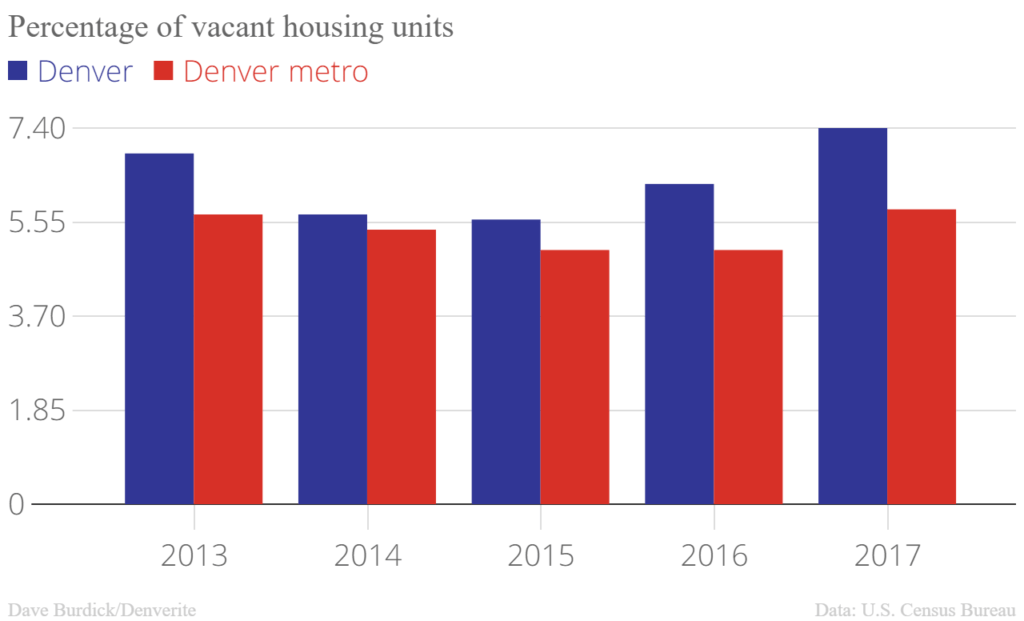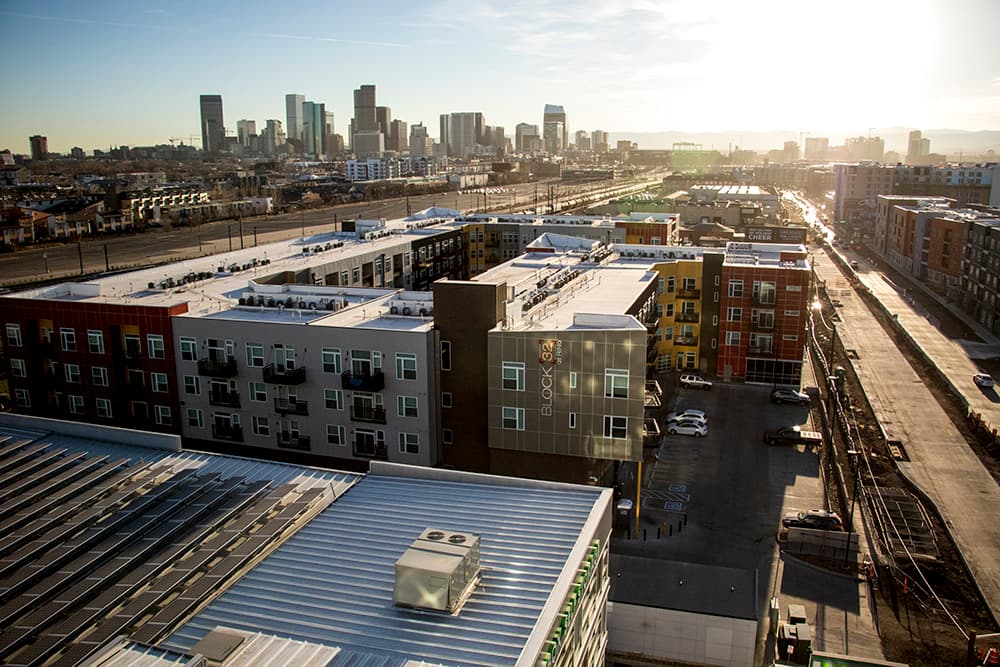Denver's rents are up, Denver's home prices are up and Denver's vacancy rate -- the percentage of housing units that are literally just sitting empty, despite all the demand for more housing -- is up. Everything's up!
New data released by the U.S. Census Bureau last week shows that the vacancy rate here in the city -- 7.4 percent in 2017 -- is up from the previous two years.
How? Why? What.
"It's frequently the case that supply and demand are out of sync," Teo Nicolais says. He's a Denver-based instructor at Harvard Extension School specializing in real estate. "In real estate, there is a very classic pattern which emerges."
He goes on to say that at first -- like in the wake of the Great Recession -- there isn't much housing being built. Then demand builds up because more people are being born and, in Denver's case, more people are arriving. And it keeps building up. And eventually, there's enough demand that people start the expensive work of building new supply.
"Demand will reach this feverish pitch as prices go up and scarcity is all around us, even as we're building new buildings, because the new supply has not yet come online," he says.
That's when prices get really high. That's why housing prices have gone up 50 percent not only in the city but also in the Denver-Aurora-Lakewood metro area in the last four years, he says. It's why median rents in the metro area have gone up 35 percent, and by about 43 percent in Denver.
That indicates a lot of demand for housing to be built, which is responsible -- not to throw too many stats at you -- for the 500 percent increase in people joking that the official bird of Denver is the crane. But even though there's a lot of housing being built, it's not immediately alleviating the demand.
"We are seeing significant vacancies in brand-new developments," Nicolais says. Those big, high-end rentals aren't renting quickly.
And that partially explains why Denver's vacancy rate over the years looks like this, with the decrease in vacancy rate before 2015, and increase after:

Let's take a quick sidebar to talk about the Denver metro area.
Jenny Usaj, who owns Denver's Usaj Realty, says that first of all she's "super bullish" on Denver metro real estate.
"There's not enough inventory for the number of people moving here," she says.
"There's a dynamic that's missing in the community of real estate, and that's first-time homebuyer, entry-level price points. We need condos to be built and they're not."
And what happens if people can't buy their first homes? They rent a bit longer. And what if they can't afford rising rents in Denver, or maybe they're trying like hell to save for that first home? They seek lower rents near the city where they likely work or play.
Take a look at that vacancy rate chart again. The metro area's vacancy rate is lower than the city's.
"I think that's part of the pricing," Usaj says. "If Denver was more affordable ... people are always going to live near their economic centers. But the prices are a little bit off still with the product that is available for the people that need housing."
So: Lakewood! Aurora! Arvada!
Why isn't anybody building affordable housing?
Usaj and Nicolais and anyone in real estate who can get a minute of your time in Denver will tell you that the stuff getting built is high-end apartments, and that's because the costs of materials and labor have gone up so much over the last several years that the only way a developer can afford to build is to make high-end stuff -- and because the costs associated with building condos right now is even higher.
Nicolais has a very big-picture way of looking at it. When asked if there's any point at which the demand for housing that isn't on that high end causes more to be built, he's quite blunt:
"I'm gonna say emphatically no," he says. "Affordable housing is not built, it is accumulated. The most affordable units right now are 1970s-vintage units."
Those were new and fancy once, too, he says.
"In 2060 all these units that are being built today will be 40 years old. They will be the affordable housing of that decade."
So should you just upload your brain to the mainframe and wait it out?
...yes?
Usaj says we should get used to it.
"I feel like in Denver there's a bit of a new normal that's been established," she says.
All those stories from the first half of the decade about how the market was red-hot and it was so crazy how many offers there were on places with buyers aggressively competing with each other -- that's just what Denver is now.
Even in 2015, Usaj says, "people may have said, 'Oh I'm going to wait.' Well, you may wait for a long, long time. Until builders build more inventory in Denver, it's not enough if you want to live in Denver and you have an average job."
One last thing Usaj is curious about: Who's actually moving into some of those high-end rentals?
"I have a boots-on-the-ground intuition that it's because people are choosing Denver based on lifestyle, not economic opportunities."
She thinks that people may be moving here without local jobs -- perhaps working for companies in Chicago, in New York, in places that pay better. We do know a higher percentage of people are working from home.












